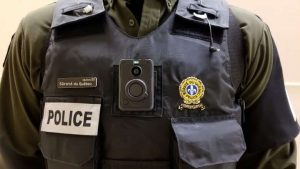Quebec provincial police will test out body cameras in 4 regions

Quebec provincial police will soon outfit officers with body cams in four regions as part of a pilot project aimed at testing out the technology.
Federal government set to intervene as Port of Montreal heads toward another strike
In Rimouski-Neigette, Drummond, Beauharnois-Salaberry and Vallée-de-l’Or, officers will be given the portable cameras to use during most police interventions for a period of six months, the Sûreté du Québec and government officials announced at a briefing Monday.
Only 10 officers will take part in the pilot project in each region.
The project’s launch is staggered until the fall for each region, starting with Rimouski-Neigette today.
In Rimouski-Neigette and Beauharnois-Salaberry, the cameras can be turned on and off manually, but there is a list of types of interventions officers must have them on for.
In Vallée-de-l’Or and Drummond, there is also an automatic function on the cameras that turns them on as soon as an officer pulls their firearm or stun gun out of its holder.
Val-d’Or, a city where several Indigenous women came forward with allegations of police abuse, is part of the Vallée-de-l’Or region.
The Nunavik police force in Northern Quebec has been conducting a portable camera project of its own, with 18 cameras being used by officers and more being deployed. It plans to share its findings with the Public Security Ministry.

Why another pilot project?
Tracy Wing, whose 17-year-old Riley Fairholm was shot and killed in a provincial police intervention in Lac-Brome, Que., said she is frustrated that the province is choosing to launch a pilot project instead of outfitting all SQ officers across the province with the cameras immediately.
“It’s technology that’s being used all over North America and in major cities throughout Canada, and of course in the United States,” Wing said in an interview Sunday, prior to the announcement.
“It’s already tried and true and it’s effective.”

She believes that, had SQ officers been wearing cameras the night of her son’s death, Quebec’s police watchdog would have been able to better understand the situation and given her family clarity.
“The night that my son died, there were six police officers and my son — and they’re the only witnesses,” said Wing. ” I think a body cam would be able to explain a lot of those things and we wouldn’t have to rely on the police’s version.”
Montreal police launched a similar pilot project back in 2018, but ultimately gave the cameras a thumbs down after a year-long trial.
That project involved 78 SPVM officers and the force concluded the body cameras had little impact on police interventions and would cost far too much.
Fo Niemi, director of the Center for Research-Action on Race Relations, said body cameras are essential in preventing incidents of racial profiling and in holding officers accountable.
“It’s about time because body cams are going to be the way of the future,” he said of the pilot project.
“With all the recent shootings in the United States, we have seen how body cams can make a difference in terms of the evidence, in terms of providing for a very complete version of exactly what happened.”

Niemi said the cost of the cameras should not be an issue. He said, in the time since the SPVM released its pilot project results, newer and more affordable options have come out.
“The other thing, too, is a body cam may have this kind of conditioning effect on an officer’s conduct and attitude or behaviours toward a citizen … it can be what we call life-saving and a life-changing device,” he said.
Niemi hopes the province’s pilot project will encourage the SPVM to revisit its decision.
Last February, Montreal Mayor Valérie Plante said she had asked Guilbault to have the SPVM join the project.








Redes Sociais - Comentários